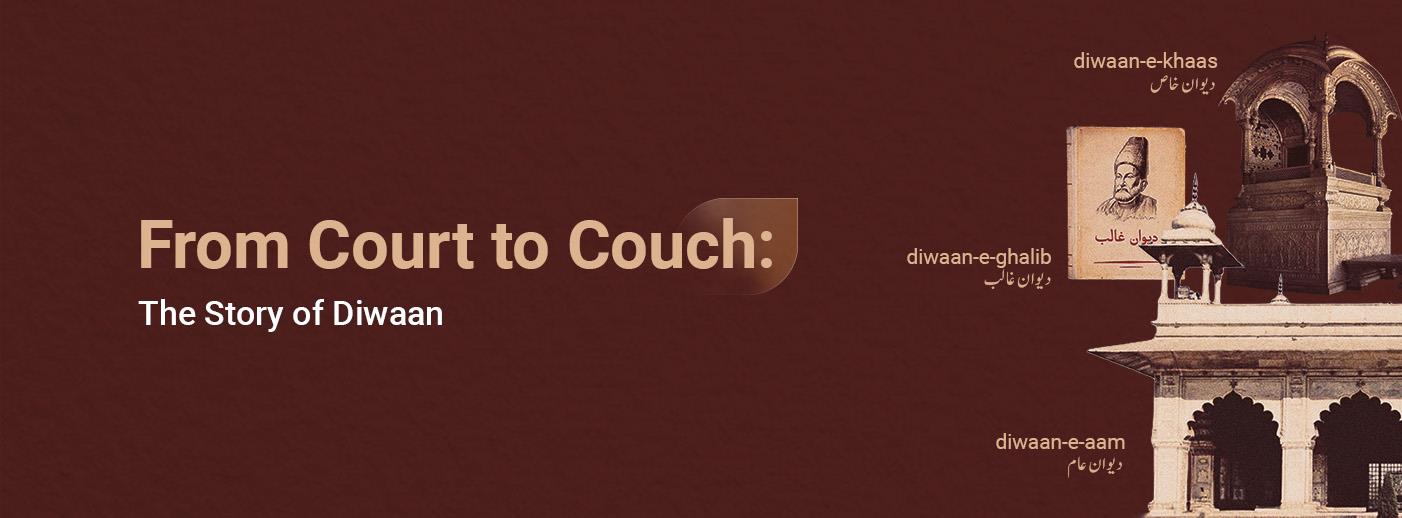زیادہ تلاش کیے گئے الفاظ
محفوظ شدہ الفاظ
کِھسیانی بِلّی کَھمبا نوچے
جسے غصہ آرہا ہو وہ دوسروں پر اپنی جھلاہٹ اتارتا ہے، بے بسی میں آدمی دوسروں پر غصہ اتارتا ہے، شرمندہ شخص دوسروں پر اپنی شرمندگی اتارتا ہے، کمزور کی جھنجھلاہٹ
چَمَنِسْتان
ایسا باغ جہاں پھول کثرت سے ہوں، ایسی جگہ جہاں دور تک پھول ہی پھول اور سبزہ سبزہ نظر آئے، گلزار، گلستان، باغ، پھولوں کا قطعہ، سبز کھیت
From Court to Couch: The Story of Diwaan

Ever come across a word that can walk you into a royal court, summon you before a head constable, charm you with collection of Ghazals of your favourite poet, and then tuck you into a soft bed for an afternoon nap?
Well, diwaan (دیوان) is that magical, shape-shifting word.
Strange? Not really. Because in the wondrous world of Urdu, words aren’t just words — they’re entire worlds.
From Thrones to Tribunals
Let’s start at the top. The word “diwaan” entered Urdu from Persian, and right from the beginning, it came dressed in royal robes.
• In one context, it means a royal court.
• In another, it could be a government department — think finance or military.
• It’s also an official title: diwaan-e-KHazaana (Finance Minister), diwaan-e-fauj (Military Head).
• Or even just a record book or register.
No wonder the word is equally at home in palaces and paperwork.
diwaan KHaana: دیوان خانہ Where Royals and Relatives Gather
diwaan KHaana — now here’s a word that echoes in history and in homes.
Traditionally, it referred to that elegant area in a mansion or haveli where guests were received. In modern terms? Your drawing room. Only more poetic.
And in case you’re picturing something simple, let’s jog your memory:
Remember the diwaan-e-‘aam and diwaan-e-KHaas in Delhi’s Red Fort?
• diwaan-e-aam: The public audience hall where emperors met the masses.
• diwaan-e-KHaas: A more exclusive space for nobles and close courtiers.
It’s amazing how this word brings with it the echoes of royal footsteps and the rustle of courtly robes.
From Civil Suits to Sanity Slips
The word "Diwani" (دیوانی) is commonly used in the context of civil courts — especially for cases involving financial or personal rights.
You must have heard of Deewani Muqadma دیوانی مقدمہ (civil suit) and Faujdaari Muqadma فوجداری مقدمہ (criminal case).
"Diwani Karna" is a commonly used idiom, meaning to pursue a case in a civil court.
Interestingly, the word Deevaana (دیوانہ), meaning mad or eccentric, also comes from Persian. Diwaani is the feminine form of Deevana.
There is even a proverb:
"Deevani aadmi ko deevana kar deti hai"
(Civil litigation drives a sane man mad.)
This reflects how civil cases can be so long-drawn that they exhaust one's patience and sanity.
Poetic diwaan
If you’re a poetry lover, you know the word diwaan as a collection of a poet’s ghazals. As
Diwaan-e-Ghalib — Diwaan Meer Taqi Meer etc . Every poet dreams of leaving behind a Diwaan. It’s not just a book — it’s a legacy
"In a Divan, the ghazals are arranged according to the letters of the alphabet, that is, based on the last letter of the ghazal’s radif (refrain). In this way, the ghazals are organized from alif to ye.".
And Finally, the Comfiest diwaan of All
Now let’s fast-forward to your living room. Right there, between the sofa and the coffee table, sits the modern diwaan — a long, cushioned seat perfect for lounging, napping, or scrolling endlessly on your phone.
How the mighty word has relaxed!
And wait — I am sure you know diwaan is also a surname in India. A nod to an ancestor who once held an important position in the royal court or treasury.
So What’s in a Word?
In the case of diwaan — a royal court, a courtroom, a couch, and a collection of couplets, all rolled into one.
Delete 44 saved words?
کیا آپ واقعی ان اندراجات کو حذف کر رہے ہیں؟ انہیں واپس لانا ناممکن ہوگا۔






